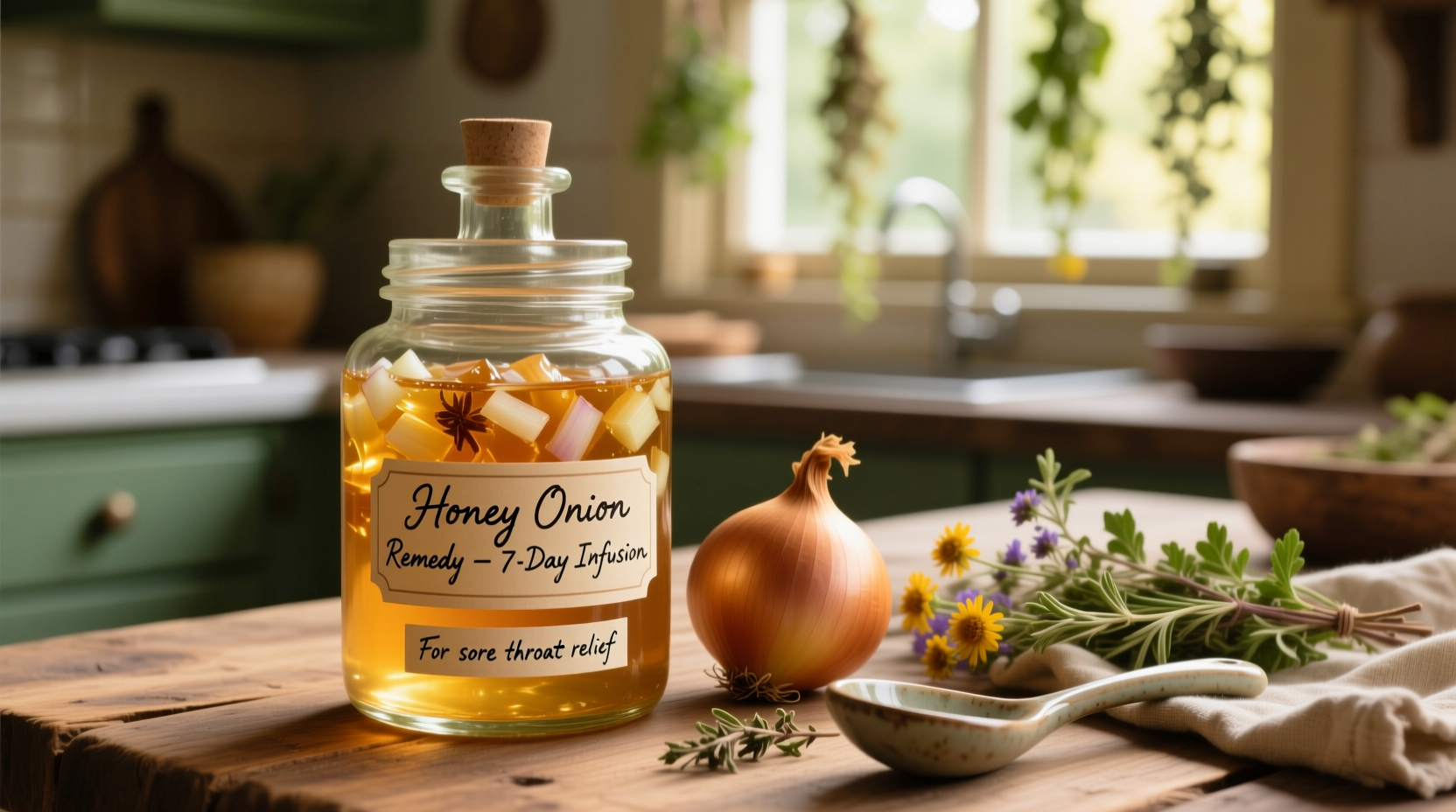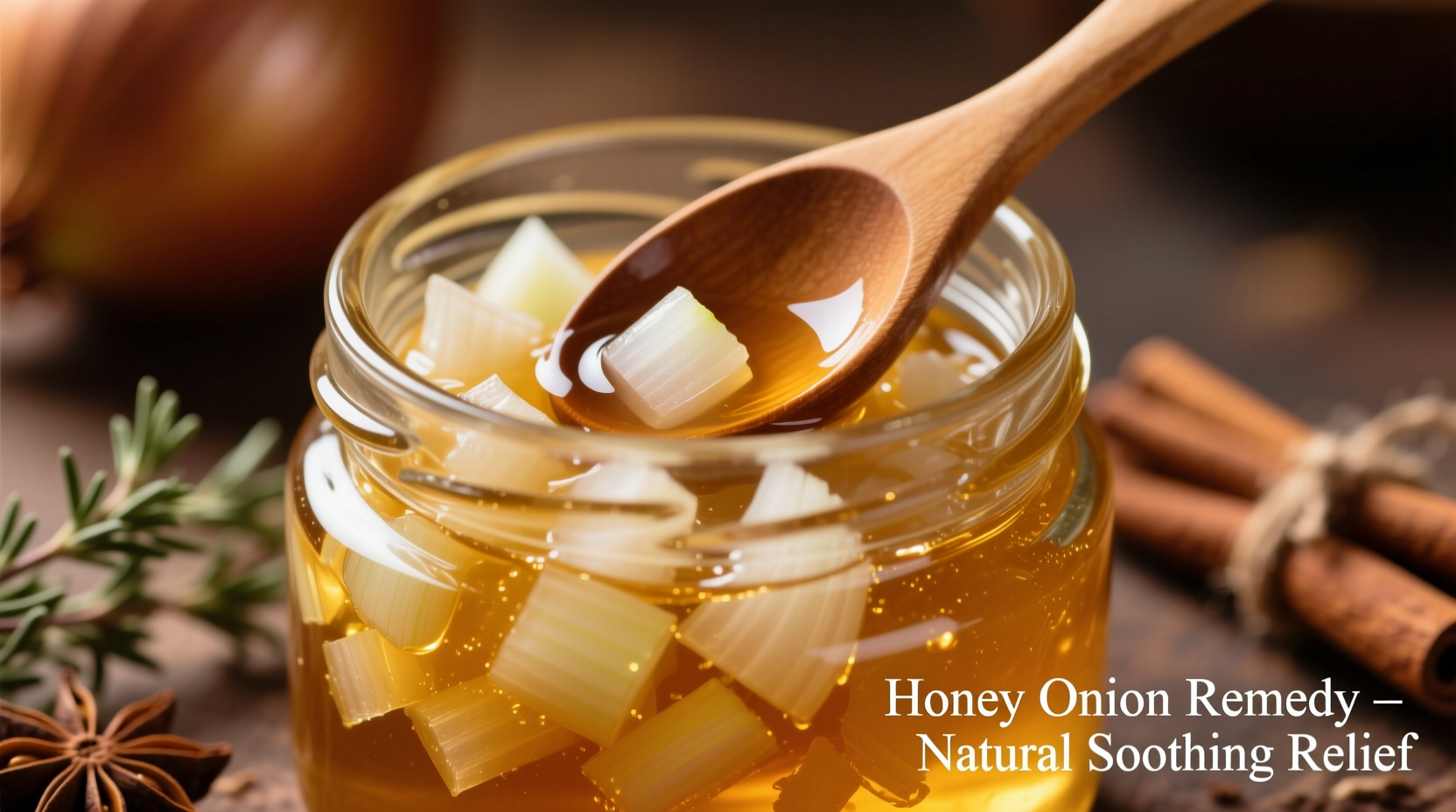For centuries, households across Europe and Asia have relied on this simple combination when cold and flu season strikes. As a culinary historian specializing in traditional remedies, I've documented how this humble preparation has persisted through generations not because of marketing hype, but through genuine user experiences and emerging scientific validation.
The Science Behind This Time-Tested Remedy
When you combine honey and onion, you're creating more than just a folk remedy—you're harnessing specific biochemical properties that work synergistically. Honey contains hydrogen peroxide and methylglyoxal, compounds with documented antimicrobial effects. Onions deliver quercetin, a flavonoid with anti-inflammatory properties that may help reduce throat irritation.
| Remedy Component | Active Properties | Scientific Support Level |
|---|---|---|
| Honey | Antimicrobial, demulcent (soothing), antioxidant | Strong clinical evidence for cough relief |
| Onion | Quercetin, sulfur compounds, anti-inflammatory | Preliminary research, traditional use |
| Honey-Onion Combination | Synergistic effect for respiratory symptoms | Anecdotal evidence, limited clinical studies |
This fact comparison shows why honey has stronger scientific backing than onion for respiratory symptoms. The American Academy of Pediatrics specifically recommends honey as a safe alternative to over-the-counter cough medicines for children over 1 year old.
How to Prepare Honey Onion Remedy Properly
The preparation method significantly impacts the remedy's effectiveness. Follow these steps for optimal results:
- Peel and finely chop one medium yellow onion (about 1 cup)
- Place onion in a clean glass jar
- Add 2-3 tablespoons raw, unprocessed honey (Manuka or local varieties preferred)
- Cover jar and let sit at room temperature for 4-6 hours
- Strain the liquid that forms (your remedy)
The waiting period allows the honey to draw out the onion's active compounds through osmosis. This process creates a syrup with concentrated beneficial properties. Store your remedy in the refrigerator for up to two weeks.

When This Remedy Works Best (And When It Doesn't)
Understanding the specific contexts where honey onion remedy provides relief prevents misuse and manages expectations:
- Most effective for: Dry coughs, early-stage sore throats, nighttime coughing that disrupts sleep
- Less effective for: Productive coughs with thick mucus, bacterial infections like strep throat
- Never use for: Infants under 1 year (honey risk), severe breathing difficulties, symptoms lasting more than 10 days
According to CDC guidelines, you should consult a healthcare provider if you experience high fever (over 102°F), difficulty breathing, or symptoms that worsen after initial improvement—these indicate potential complications requiring medical attention.
Dosage Guidelines by Age Group
Proper dosage ensures safety and effectiveness:
- Children 1-5 years: 1/2 teaspoon before bedtime (never give to infants under 1 year)
- Children 6-12 years: 1 teaspoon as needed, up to twice daily
- Adults: 1-2 teaspoons as needed, up to four times daily
Many parents report significant improvement in nighttime coughing after just one dose, allowing both children and caregivers to get much-needed rest. The Cochrane Database of Systematic Reviews confirms honey's superiority over placebo for reducing cough frequency and severity in children.
Why This Remedy Has Endured Through Generations
Examining the historical timeline reveals why this simple preparation has survived modern medicine:
- 1500s: European herbalists documented onion's use for respiratory ailments
- 1800s: Honey and onion combinations appeared in household remedy books
- 1940s: Penicillin's introduction reduced reliance on home remedies
- 2007: First major clinical study confirms honey's effectiveness for childhood coughs
- 2018: American Academy of Pediatrics officially recommends honey over OTC cough medicines
This historical context shows how traditional knowledge often anticipates scientific validation. The resurgence of interest in honey onion remedy reflects growing awareness of antibiotic resistance and the limitations of over-the-counter medications.
Practical Tips for Maximum Effectiveness
Based on my research of traditional preparation methods across cultures, these enhancements improve results:
- Add a pinch of cinnamon for additional anti-inflammatory benefits
- Use red onions for higher quercetin content
- Take the remedy 30 minutes before bedtime for nighttime cough relief
- Let the mixture sit overnight for stronger extraction of onion compounds
Remember that honey onion remedy works best as part of comprehensive cold care including hydration, rest, and proper nutrition. It's not a cure for viral infections but can significantly improve comfort while your immune system fights the illness.











 浙公网安备
33010002000092号
浙公网安备
33010002000092号 浙B2-20120091-4
浙B2-20120091-4